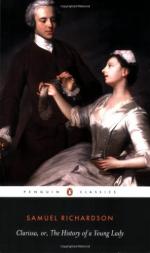I shall go on Monday to a kind of ball, to which Colonel Ambrose has invited me. It is given on a family account. I care not on what: for all that delights me in the thing is, that Mrs. and Miss Howe are to be there;—Hickman, of course; for the old lady will not stir abroad without him. The Colonel is in hopes that Miss Arabella Harlowe will be there likewise; for all the men and women of fashion round him are invited.
I fell in by accident with the Colonel, who I believe, hardly thought I would accept of the invitation. But he knows me not, if he thinks I am ashamed to appear at any place, where women dare show their faces. Yet he hinted to me that my name was up, on Miss Harlowe’s account. But, to allude to one of Lord M.’s phrases, if it be, I will not lie a bed when any thing joyous is going forward.
As I shall go in my Lord’s chariot, I would have had one of my cousins Montague to go with me: but they both refused: and I shall not choose to take either of thy brethren. It would look as if I thought I wanted a bodyguard: besides, one of them is too rough, the other too smooth, and too great a fop for some of the staid company that will be there; and for me in particular. Men are known by their companions; and a fop [as Tourville, for example] takes great pains to hang out a sign by his dress of what he has in his shop. Thou, indeed, art an exception; dressing like a coxcomb, yet a very clever fellow. Nevertheless so clumsy a beau, that thou seemest to me to owe thyself a double spite, making thy ungracefulness appear the more ungraceful, by thy remarkable tawdriness, when thou art out of mourning.
I remember, when I first saw thee, my mind laboured with a strong puzzle, whether I should put thee down for a great fool, or a smatterer in wit. Something I saw was wrong in thee, by thy dress. If this fellow, thought I, delights not so much in ridicule, that he will not spare himself, he must be plaguy silly to take so much pains to make his ugliness more conspicuous than it would otherwise be.
Plain dress, for an ordinary man or woman, implies at least modesty, and always procures a kind quarter from the censorious. Who will ridicule a personal imperfection in one that seems conscious, that it is an imperfection? Who ever said an anchoret was poor? But who would spare so very absurd a wrong-head, as should bestow tinsel to make his deformity the more conspicuous?
But, although I put on these lively airs, I am sick at my soul!—My whole heart is with my charmer! with what indifference shall I look upon all the assembly at the Colonel’s, my beloved in my ideal eye, and engrossing my whole heart?
LETTER XXXIII
Miss Howe, to miss Arabella
Harlowe
Thursday, July 20.




